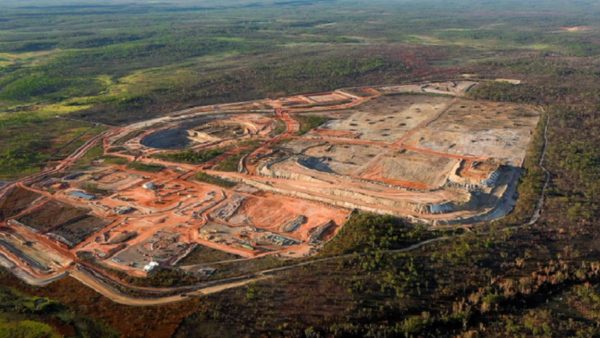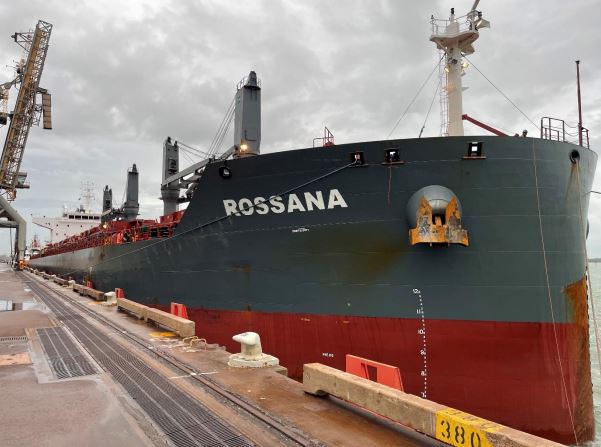Adelaide-headquartered miner Core Lithium announced the bulk carrier Rossana, loaded with 15,000 dry metric tonnes of 14% lithium oxide spodumene direct shipping ore (DSO) sourced from the company’s Finniss lithium project in the Northern Territory, has set sail from the Port of Darwin.
The Liberian-registered ship left Darwin on Wednesday bound for China’s southernmost port, Fangcheng, where the unprocessed ore will be used in the manufacture of lithium batteries for renewable energy storage and to power electric vehicles (EVs).
Core Lithium said the ore was sold to an unidentified “lithium-ion battery supply chain participant” in China for USD 951 (AUD 1,382) per dmt. This values the shipment at approximately $21 million (USD 14.25 million).
Core Lithium Chief Executive Officer Gareth Manderson described the maiden shipment of ore from the $89 million (USD 60.7 million) Finniss project as a significant milestone for the company, allowing it to successfully commission the logistics chain linking the mine site to the Darwin Port.
“Our focus now is to safely complete construction of the dense media separation plant at Finniss to enable us to produce high-quality spodumene concentrate,” he said.
The Finniss mine is the Northern Territory’s first new mine in more than a decade and the country’s the first lithium supply project to be developed outside of Western Australia. The project, located about 80 kilometres southwest of Darwin, is expected to produce about 16 million tonnes of lithium-bearing ore over the mine’s 12-year life expectancy, primarily for overseas exports with a focus on Asia.

Image: Core Lithium
Mining operations commenced at the site in October 2022 and while the project has not yet started producing spodumene concentrate – a feedstock for battery-grade lithium chemicals – the company said it is “on track” to begin in the first half of 2023.
“Core has made good progress during 2022 to transition from a mine developer to lithium producer,” Manderson said. “In 2023 we will continue this transition and the work required to build a good quality operating business in the Northern Territory.”
ASX-listed Core Lithium has already secured offtake for 80% of Finniss production with binding agreements in place with China-based lithium processors Ganfeng Lithium and Sichuan Yahua Industrial Group to supply 75,000 tonnes per annum (tpa) of spodumene concentrate to each company over four years from 2024.
Core Lithium also holds a non-binding Memorandum of Understanding (MOU) with Geneva-based Transamine Trading for the supply of 50,000tpa of spodumene concentrate from Finniss over a five-year period.
Core Lithium had also signed a term sheet to supply United States-headquartered EV giant Tesla with 110,000 dmt of lithium spodumene concentrate over four years but the deadline for the deal passed in October 2022 without the agreement being completed.
Despite the breakdown of the Tesla deal, Northern Territory Chief Minister Natasha Fyles said the Finniss mine remains a globally significant project for lithium battery production, which she said will “power the future through electric vehicles and renewable energy storage.”
“This a major milestone not only for Core Lithium, but for the renewable and critical minerals industry,” she said. “Lithium is the way of the future.”
Australia’s Future Battery Industries Cooperative Research Centre has forecast the global battery market – which continues to be dominated by lithium-ion models – to grow by nine to 10 times by 2030 and 40-fold by 2050. This would equate to approximately $23 trillion being spent on the technology before 2050.
Australia is the world’s biggest producer of lithium, accounting for an estimated 30% of known resources. The Department of Industry, Science and Resources predicts the nation’s lithium export earnings will increase more than ten-fold in two years, from $1.1 billion in 2020–21 to $16 billion in 2022–23 and $17 billion in 2023–24. This would make lithium Australia’s sixth largest “resources and energy” export commodity.
This content is protected by copyright and may not be reused. If you want to cooperate with us and would like to reuse some of our content, please contact: editors@pv-magazine.com.









1 comment
By submitting this form you agree to pv magazine using your data for the purposes of publishing your comment.
Your personal data will only be disclosed or otherwise transmitted to third parties for the purposes of spam filtering or if this is necessary for technical maintenance of the website. Any other transfer to third parties will not take place unless this is justified on the basis of applicable data protection regulations or if pv magazine is legally obliged to do so.
You may revoke this consent at any time with effect for the future, in which case your personal data will be deleted immediately. Otherwise, your data will be deleted if pv magazine has processed your request or the purpose of data storage is fulfilled.
Further information on data privacy can be found in our Data Protection Policy.